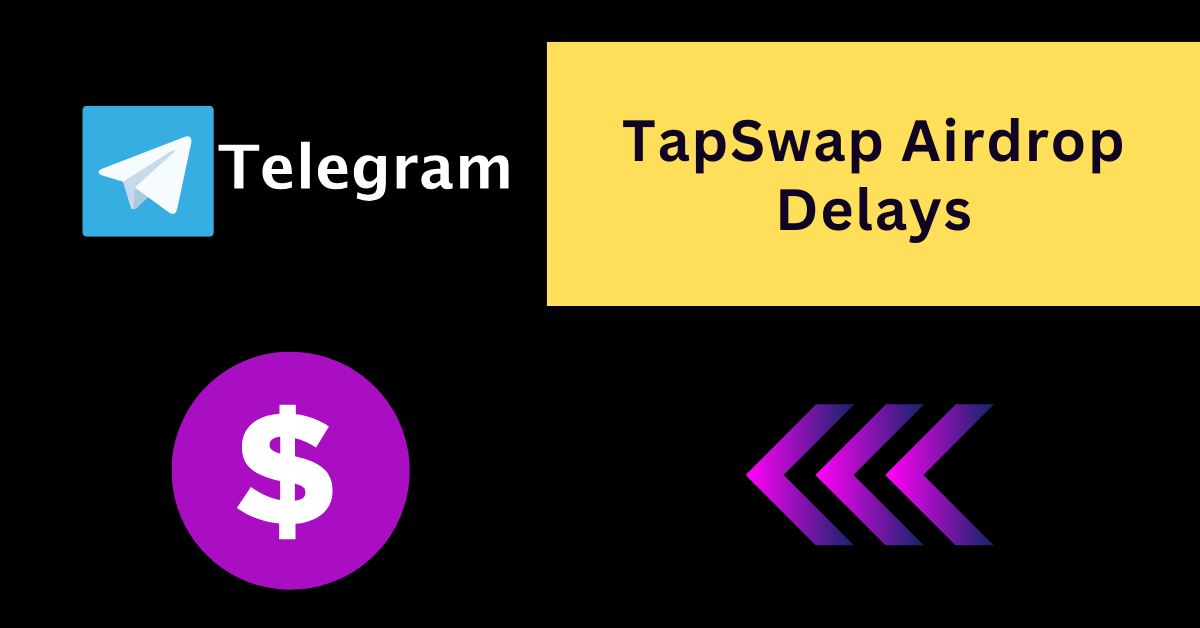For the millions of users in the “tap-to-earn” world, TapSwap has created quite a stir. As a Telegram-based app, TapSwap rewards users with TAPS tokens for completing simple tasks like tapping a button, watching YouTube videos, or logging in daily.
However, the long-awaited token generation event (TGE) has faced multiple delays, leaving holders wondering: Will TapSwap follow in the footsteps of the Pi Network, where tokens accumulated but weren’t immediately convertible to fiat currencies?
Why TapSwap’s Airdrop is Delayed
TapSwap, with over 70 million users, initially planned its TGE for July. This was postponed to the third quarter, yet October has come and gone without an airdrop.
The developers say the delay is strategic, intending to establish a broader ecosystem before launching TAPS tokens to the public. Their aim?
To avoid the fate of similar tap-to-earn tokens that saw massive sell-offs right after their launches.
For instance, tokens like Hamster Kombat and Notcoin initially surged but later dropped by over 70% from their all-time highs.
Developers hope that building the TapSwap ecosystem before releasing TAPS will give the token lasting value and prevent the mass dumping seen in similar projects.
The “Pi Network Effect” and TapSwap’s Delay
The delay in TapSwap’s TGE brings up comparisons to the Pi Network, which launched in 2018 and quickly gained millions of users.
Like TapSwap, Pi Network users accumulated tokens by tapping a button but couldn’t convert them into cash for years, causing frustration.
Despite Pi Network’s promises, users are still waiting for a full mainnet launch. TapSwap’s developers insist that the TGE delay is a calculated move to avoid market oversaturation and token devaluation, common in tap-to-earn and play-to-earn platforms.
Many of TapSwap’s supporters are still optimistic, with the team hinting at partnerships and utility-building efforts behind the scenes.
The developers have also mentioned they’re working on updates that will bring “real token utility” to TapSwap, distinguishing it from Pi Network, where some users are still skeptical about the project’s future.
What Users Can Expect Going Forward
TapSwap’s unique position on Telegram allows it to tap into a massive market, with Telegram boasting nearly a billion users.
As a result, the app has become immensely popular, growing its YouTube presence to over 5 million subscribers and attracting millions of followers on X (formerly Twitter).
The delay may be strategic, given the track record of tokens released too soon that later experienced significant sell-offs.
Tokens like Decentraland (MANA) and Axie Infinity (AXS) saw massive value drops after initial success, leaving many investors disappointed.
If TapSwap succeeds in establishing meaningful use cases and partnerships, it could avoid the pitfalls of previous tap-to-earn tokens.
However, TapSwap has yet to announce any exchanges or pre-listing activities for TAPS, unlike competitors like Hamster Kombat and Catizen, who partnered with exchanges for pre-market trading before their airdrops.
The Future of Tap-to-Earn Platforms
The tap-to-earn and play-to-earn model faces the challenge of sustaining user engagement and token value.
Many users are drawn to the idea of earning passive income through simple tasks, but maintaining interest once the token value stabilizes or declines is often difficult.
While TapSwap’s delayed TGE may frustrate some users, it could be a smart approach to ensure that TAPS gains real traction and utility.
By focusing on growing the platform’s ecosystem before the airdrop, the developers may be aiming to create a more sustainable model for TAPS in the long term.
For TapSwap users, patience may be the best strategy. The delay, while frustrating, signals that the developers are keen on building a product that will hold its value rather than delivering a quick but unsustainable launch.
As the tap-to-earn industry matures, TapSwap’s approach might set a new standard, potentially allowing it to succeed where other tokens have failed.
Ultimately, the success of TapSwap’s TGE depends on whether its team can deliver a robust ecosystem and attract long-term interest, rather than following the path of quick but fleeting gains seen in other tap-to-earn networks.

